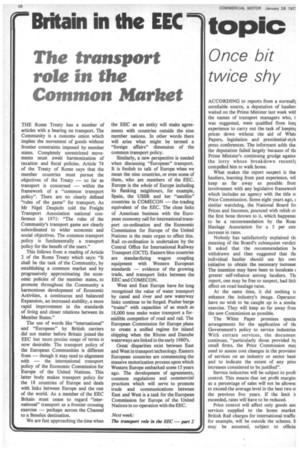Britain in the EEC topic
Page 40

If you've noticed an error in this article please click here to report it so we can fix it.
The transport role in the Common Market
THE Rome Treaty has a number of articles with a bearing on transport. The Community is a customs union which implies the movement of goods without frontier constraints imposed by member states. Completely unrestricted movements must await harmonization of taxation and fiscal policies. Article 74 of the Treaty of Rome says that the member countries must pursue the objectives of the Treaty — so far as transport is concerned — within the framework of a "common transport policy". There are no clearly defined "rules of the game" for transport. As Mr Nigel Despicht told the Freight Transport Association national_ conference in 1971: "The rules of the Community's transport game are clearly subordinated to wider economic and social objectives. The common transport policy is fundamentally a transport policy for the benefit of the users."
This follows from a reading of Article 2 of the Rome Treaty which says: "It shall be the task of the Community, by establishing a common market and by progressively approximating the economic policies of the member states, to promote throughout the Community a harmonious development of Economic Activities, a continuous and balanced Expansion, an increased stability, a more rapid improvement in the standards of living and closer relations between its Member States."
The use of words like "international" and "European" by British carriers did not matter before Britain joined the EEC but more precise usage of terms is now desirable. The transport policy of the European Communities is different from — though it may tend to alignment with — the international transport policy of the Economic Commission for Europe of the United Nations. This latter body makes transport policy for the 18 countries of Europe and deals with links between Europe and the rest of the world. As a member of the EEC Britain must cease to regard "international" transport as a frontier crossing exercise — perhaps across the Channel to a Benelux destination.
We are fast approaching the time when the EEC as an entity will make agreements with countries outside the nine.
member nations. In other words there will arise what might be termed a "foreign affairs" dimension of the common transport policy.
Similarly, a new perspective is needed when discussing "European" transport.
It is foolish to talk of Europe when we mean the nine countries, or even some of them, who are members of the EEC.
Europe is the whole of Europe including its flanking neighbours, for example, Spain, the USSR and her "satellite" countries in COMECON — the trading equivalent of the EEC. The close links of American business with the Euro pean economy *all for international trans port co-ordination and the Economic Commission for Europe of the United Nations is the main organ to effect this.
Rail co-ordination is undertaken by the Central Office for International Railway Transport (OCTI). Eastern bloc countries are standardizing wagon coupling equipment with Western European standards — evidence of the growing trade, and transport links between the EEC and COlvIECON.
West and East Europe have for long recognized the value of water transport by canal and river and new waterway links continue to be forged. Pusher barge "trains" with capacities of as much as 18,000 tons make water transport a for midible competitor of road and rail. The European Commission for Europe plans to create a unified regime for inland shipping when the Rhone and Danube waterways are linked in the early 1980's.
Great disparities exist between East and West in transport technology. Eastern European countries are commencing the massive motorization process upon which Western Europe embarked some 15 years ago. The development of agreements, common regulations and commercial practices which will serve to promote trade and communications between East and West is a task for the European Commission for Europe of the United Nations in co-operation with the EEC.
Next week: The transport role in the EEC — part 2




























































































